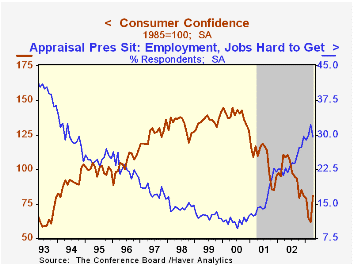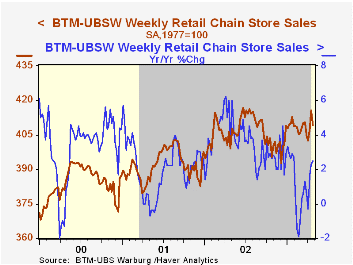 Global| Apr 29 2003
Global| Apr 29 2003Employment Cost Index Surged
by:Tom Moeller
|in:Economy in Brief
Summary
The employment cost index rose last quarter by twice Consensus expectations for a 0.7% gain. The gain was double the 4Q increase. Faster growth in wages & salaries accounted for most of the acceleration in the ECI. The 1.0% quarterly [...]

The employment cost index rose last quarter by twice Consensus expectations for a 0.7% gain. The gain was double the 4Q increase.
Faster growth in wages & salaries accounted for most of the acceleration in the ECI. The 1.0% quarterly gain was the strongest since 1Q 2001.
The surge in wages was led by 1.0% unadjusted (3.2% y/y) growth in durable manufacturing industries. The 1.1% (2.9% y/y) pop in service producing industry wages was concentrated in wholesale trade and finance, insurance & real estate. The gain followed unusually slow growth in the prior two quarters.
Benefit costs (roughly 30% of total compensation) jumped 2.4% (6.1% y/y). That was double the average rate of increase in 2002. Benefit costs in both goods-producing and service-producing industries surged due to strong growth in health insurance and defined benefit pension plan costs.
| ECI- Private Industry Workers | 1Q'03 | 4Q'02 | Y/Y | 2002 | 2001 | 2000 |
|---|---|---|---|---|---|---|
| Compensation | 1.4% | 0.7% | 3.8% | 3.2% | 4.2% | 4.4% |
| Wages & Salaries | 1.0% | 0.5% | 3.0% | 2.7% | 3.8% | 3.9% |
| Benefit Costs | 2.4% | 1.2% | 6.1% | 4.7% | 5.1% | 5.6% |
by Tom Moeller April 29, 2003

The Conference Board’s Index of Consumer Confidence jumped much more than expected in April. The index rose 31.9% m/m to 81.0 and rivaled the gain following the end of the Gulf War in 1991. Consensus expectations were for a smaller rise to 70.0.
The survey of Consumer Confidence began April 1 and finished on April 22, nearly two weeks after Baghdad fell to U.S. forces.
The rise in Confidence was nearly three times as great as the rise in the index of Consumer Sentiment from the University of Michigan.
The surge in confidence reflected a 38.1% jump in consumer expectations to the highest level this year. The present situation index rose a lesser 22.6% back to the January level.
Jobs were viewed as hard to get by fewer survey respondents. The index fell to 29.5%, the lowest level since January. Expectations for employment opportunities in six months rose to the highest level since September. During the last ten years there has been an 86% (inverse) correlation between changes in jobs hard to get and consumer confidence.
During the last five years there has been a 75% correlation between the level of Consumer Confidence and the y/y change in real consumer spending.
The Conference Board's survey is conducted by a mailed questionnaire to 5,000 households and about 3,500 typically respond.
| Conference Board | April | Mar | Y/Y | 2002 | 2001 | 2000 |
|---|---|---|---|---|---|---|
| Consumer Confidence | 81.0 | 61.4 | -25.3% | 96.6 | 106.6 | 139.0 |
by Tom Moeller April 29, 2003

Chain store sales in the week following Easter slumped 1.6% according to the BTM-UBSW survey. The decline followed 1.9% and 1.3% gains in the prior two weeks.
With just a few days sales left to tally, April sales are 0.1% above the March average. March sales finished 0.3% above February.
During the last ten years there has been a 59% correlation between the year-to-year percent change in these chain store sales and the change in nonauto retail sales less gasoline.
The BTM-UBSW retail chain-store sales index is constructed from the sales results reported by seven retailers: Dayton Hudson, Federated, Kmart, May, J.C. Penney, Sears and Wal-Mart.
| BTM-UBSW (SA, 1977=100) | 4/26/03 | 4/19/03 | Y/Y | 2002 | 2001 | 2000 |
|---|---|---|---|---|---|---|
| Total Weekly Retail Chain Store Sales | 409.1 | 415.6 | 2.5% | 3.6% | 2.1% | 3.4% |
Tom Moeller
AuthorMore in Author Profile »Prior to joining Haver Analytics in 2000, Mr. Moeller worked as the Economist at Chancellor Capital Management from 1985 to 1999. There, he developed comprehensive economic forecasts and interpreted economic data for equity and fixed income portfolio managers. Also at Chancellor, Mr. Moeller worked as an equity analyst and was responsible for researching and rating companies in the economically sensitive automobile and housing industries for investment in Chancellor’s equity portfolio. Prior to joining Chancellor, Mr. Moeller was an Economist at Citibank from 1979 to 1984. He also analyzed pricing behavior in the metals industry for the Council on Wage and Price Stability in Washington, D.C. In 1999, Mr. Moeller received the award for most accurate forecast from the Forecasters' Club of New York. From 1990 to 1992 he was President of the New York Association for Business Economists. Mr. Moeller earned an M.B.A. in Finance from Fordham University, where he graduated in 1987. He holds a Bachelor of Arts in Economics from George Washington University.
More Economy in Brief
 Global| Feb 05 2026
Global| Feb 05 2026Charts of the Week: Balanced Policy, Resilient Data and AI Narratives
by:Andrew Cates






